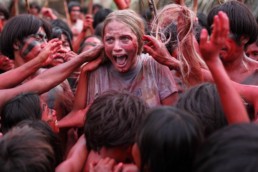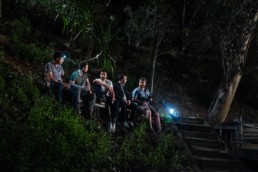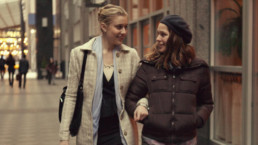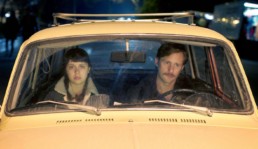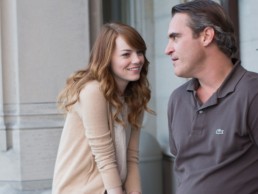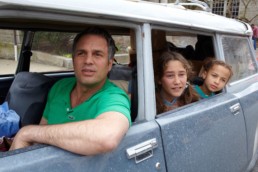Review: 'The Green Inferno'
If simple "political correctness" counts among the things that offend you, then director Eli Roth's latest midnight horror flick, The Green Inferno, a highly graphic gross-out side-show depicting a savage tribe dismemberment and cannibalism of youthful American high school students, may not be for you.
Set largely in the Amazonian jungle (which the film shoots impressively on location), The Green Inferno follows a group of collegiate activists aimed to protest human rights infractions by faceless, "evil," oil companies. Among them is beautiful and recently inspired Justine (Lorenza Izzo), an undergrad whose father serves as a United Nations heavy-weight, and who joins a protest group that shortly embarks on a third-world protest mission to bring awareness to human-rights violations. What is seen as a first act victory to their cause, successfully capturing video footage of chaining themselves to mechanical equipment amongst a bulldozed jungle terrain, leads to the real unexpected inciting incident to this film – a crash-land in the heart of unfamiliar and unsafe territory, amongst a very native and very dangerous tribe of Aboriginal people.
With special effects work from The Walking Dead's Gregory Nicotero, there is no shortage of or exploitation of queasy moments that will deter most and thrill others.
As expressed earlier, those that find offense with the subject matter of native tribal members being depicted as a very "other" sort of uncivilized people will certainly take issue with the depictions of this movie. Other audiences, those who may count themselves as Roth's most vociferous scare-savvy fans and ready for gut-spilling fun, will indeed take greater enjoyment here, through sickened groans and watching through fingers. With special effects work from The Walking Dead's Gregory Nicotero, there is no shortage of or exploitation of queasy moments that will deter most and thrill others.
Rounding out the rest of the story and cast are mysterious lead activist Alejandro (Ariel Levy), typical hot blonde Amy (Kirby Bliss Blanton), and pot-smoking comedic relief Lars (Daryl Sabara), who each play equally dull and familiar characters to this simple set-up; although they at least fill out each component of the story as is required to a humorous, watchable degree.
For a movie that makes its many unapologetic depictions of un-modernized cultures, gory and grotesque sequences depicting native tribe (who, in all painted skin, piercings, and features, evoke the authenticity of what one could believe to actually be), those looking for some small sliver of redemption will barely find it in it's final message – that industrialized capitalistic efforts are still responsible for encroaching on the land and living of these people.
The thing that makes The Green Inferno hard to pin down is its curious insight into what being kidnapped and helpless to another's total will-subjugating is as any person could be. While the impressively made The Green Inferno is a stirringly scary gross-out film, it's dumb and unstirring story should be one that is stepped to with caution.
The Green Inferno is in theaters Friday.
https://www.youtube.com/watch?v=aGGPTlrX_PE
Review: 'Digging For Fire'
Marriage, they say, takes work. Not the sort of literal, physically demanding work akin to back-breaking manual labor, but that of the emotionally demanding type; the resilient and persevering diligence that partners must work at to connect with their significant other. In indie-vet Joe Swanberg's latest film, Digging For Fire, however, both types of efforts are exhausted by a younger couple, ultimately revealing honest realizations that modern day marriage forces those involved to confront in an impressive and intimate exploration.
The young couple here consists of Lee (Rosemarie DeWitt) and Tim (Jake Johnson) – they, along with their young son Jude (in real life, Swanberg's own son), move in to the home of Lee's yoga student while on away on vacation. The home is big, complete with pool, tennis court, and Tim's discovery of a rusty revolver and bone (human?), stirring a wild fascination of what may be buried on the property.
Those familiar with Swanberg's work will know full-well going into this that the most rewarding offering in his work is the sharp level of insight into these specific sliced of Gen-Y life.
This curiosity only reveals a larger baggage that was also brought along – a checkbook that needs balancing, and further frustrations, which serves to splinter the couple even further, with Lee taking Jude to her parents' to enjoy a girls' weekend out, while Tim is left to complete the taxes, which turns into a call to his antics-driven friends, including the anarchic Ray (Sam Rockwell), best friend Phil (Mike Birbiglia) and the alluring Max (Brie Larson).
The easy metaphor and connection here, and what the title gets right at, in Digging For Fire, is that unwanted things can be discovered when the intention is to unearth to the bottom. Joe Johnson, credited as co-writer along with Swanberg, is obsessed in the digging up of the mountains, a sort of nervous tic to his real-world marriage anxieties, that ends up revealing more – a men's shoe, and ultimately, his own insecurities and acceptances, which proven poignant and thoughtful on the subject of marriage and with it, identity lost.
Those familiar with Swanberg's work will know full-well going into this that the most rewarding offering in his work is the sharp level of insight into these specific sliced of Gen-Y life. For this reviewer, a warmly woven and starkly honest look, comprising in a dually-affecting climax with arresting imagery, earns the film its praise alone. Digging For Fire is patient viewing, but mines a very endearing message that its lovely cast charms you into watching and reflecting on.
Digging For Fire is now playing in select theaters.
https://www.youtube.com/watch?v=E9OgBzdzEsY
Review: 'Mistress America'
Noah Baumbach's third latest film may also serve as the cap to a distinguishable trilogy of modernly romantic, lushly New York City pictures. Following 2012's Frances Ha and last year's While We're Young, the director returns to a familiar head-space to once again explore, praise, and ponder the peculiar aimless intellectual wanderers of Generation Y, in Mistress America.
Mistress America feels more like the sister film to Frances Ha than others, not particularly because the film is actually about a girl who becomes step-sisters with a very "Frances Halloway-like" character. Considering America was co-written by Baumbach and real-life girlfriend Greta Gerwig (who also co-wrote Frances Ha), the film circles back to a continued interest in the young, spirited, art type–this time, investigating the mind of a young undergrad coming to age identity in the internet age, so creative and cultured, and yet so incompetent and existentially clumsy.
'Mistress America' contains whip-smart intellectual musings and dialogue, further enhanced by a deft use of quick-cut editing to mine real laughs and poignancy.
Two characters share these qualities, but come at it from opposite sides. Relative newcomer Lola Kirke plays Tracy, an incoming Freshman Lit major with a fashionably off-beat beret and more creative writing ideas than friends. Her introduction to school is a lonely (yet hilarious) one, prompting her recently engaged mother to encourage her to meet up with her fiance's daughter, a whimsical near thirty-something New Yorker. Spontaneous Brooke (Gerwig) opens Tracy's eyes to a world of adventure, immediately embracing her new step-sister and taking her on a whirlwind of the city, backstage at a rock show and the trendiest of bars and parties, spurring the fascination and awe of Tracy, and inspiring her creative writing self to
What makes Mistress America so fun–and it really is, with a script whose dialogue shows how clearly Baumbach and Gerwig have their finger on this culture's hipster-pulsed zeitgeist–is how much fun the film wishes to have. As While We're Young similarly explored the self-aware character study of hipsters, America's Tracy, being all perceiving in her own right, the former film took a third act dive into blowing up the very identity hipsters. Tracey looks at Brooke with empathy. Brooke's intentions of opening a restaurant excite an encourage-able Tracy in in-present moments, yet is ultimately filtered through her own inspiration for creative writing, empathizing a person who's tragic romance is at both times invigorating and unsustainable.
Mistress America contains whip-smart intellectual musings and dialogue, further enhanced by a deft use of quick-cut editing to mine real laughs and poignancy.
84 minutes. 'Mistress America' is now playing in select cities.
https://www.youtube.com/watch?v=6z8MCW16uZY
Review: 'The Diary of a Teenage Girl'
Although the 70s' set The Diary of a Teenage Girl is adapted from a young adult novel, parents and children alike won't find commonalities with similar genre books-turned-big screen films, such books as The Perks of Being a Wallflower or The Fault in Our Stars, to the box office. A point which must pride screenwriter and director Marielle Heller, who has infused great maturity and artistically adventurous exploration into this coming-of-age story revolving around a young girl's growth through her first sexual exploration (with her mother's boyfriend), which any audience goer would assume stays true to what is definitely a more mature, stark look at embarking on adult life through a youth's eyes.
If the initial thought of this title is of simply watching rote catalogued stories of high school age deviousness, it's a wild departure from that, both in terms of subject matter and emotional depth, which makes for a heartfelt story that audiences connect early on to and stay with through the end, a credit to the successful writing/directing combo of Heller and her creative team.
This youth-set, but still R-rated, story follows Minnie (Bel Powley), a young Robert Crumb-like cartoonist who uses her wide eyes to observe all of the pathetic disappointments of her party-heavy family and adults in her life, including her casually drug-taking mother Charlotte (Kristen Wiig) and her mother's somewhat younger dumb hunk of a boyfriend Monroe (Alexander Skarsgård). Strolling down a groovy-cool San Francisco City of decades past in the film's opening scene, Minnie's clever-beyond-her-years inner voice, captured in voice-over narration, speaks to her proud victory speech of "finally" losing her virginity. Girl, with a breakout performance from Powley as Minnie, successfully conveys the inevitable and ironic conflict of relative intelligence, smart in her inner circle, but wildly unprepared for the real world that waits before her.
Harkening visual spirit, the film's whimsicality largely channels the artistic flairs of the charming 500 Days of Summer.
Winnie conveys reasoned recollection of the inner-workings of her decision through narration that is revealed to be recorded on an old microphone to an old tape recorder, the "diary" that contains boxes of tapes (whether the original diary of the source novel was a tape recorder or just a standard pen and paper journal, Girl makes the best use out of Winnie's voice and spunky language). Her decision to sleep with Monroe, whose playboy-ish nature comes with a heart of innocence itself, reasons out all of Monroe's doofusness. Although the relations between the two would amount to certain legal action in this and this film's era, the decision and power is put in Winnie's court, and she "objectively" looks past his grosser behaviors to decide that he is to be the one. Monroe, with only a moment of hesitation, commits to bed her.
What makes Girl such a win is its full-bodied emotional journey beyond this rising action, tracking wonderfully with Minnie's own. Along the way of the film's first through second acts, those of Winnie and Monroe's consensual sexual relationship growing deeper feelings, Minnie still takes reflective pauses in her own world, captured through her cartoonist wonderment of Robert Crumb-like sketches that come to life in the film itself. The film's whimsicality largely channels the artistic flairs of the charming 500 Days of Summer harkening the same artistic spirits.
Girl moves through the spurts of her and Monroe's relationship, but when that comes to bore her, the film moves to stark and harsh realities, leading to homeless living and hard-drug world flirtations. It's in this third act that the film collects all of its earned lessons that Winnie, ever the headstrong girl who thought she knew how to handle her interpretation of life, comes crashing down. As The Diary of a Teenage Girl ultimately shows, it's the story of how naive decisions serve to teach the most important life lessons.
The Diary of a Teenage Girl opens limited today.
https://www.youtube.com/watch?v=M9LNsSjnqBM
Director Ross Katz on 'Adult Beginners'
New on Blu-Ray and DVD this Tuesday, is the adult comedy Adult Beginners, starring Nick Kroll, Rose Byrne, and Bobby Cannavale. Directed by Ross Katz from an original story by Kroll, the result is a joyous look at growing up and into adulthood that is this generation's existential conflict. Speaking exclusively with the director by phone, Katz shared stories of his time making Adult Beginners, as well as his entire experience making many different types of movies, doing many types of jobs, and working with many different legends of the craft (his first job in film was as a grip on Tarantino's Reservoir Dogs, and worked his way to producing the Academy-Award nominated Lost in Translation). A jovial spirit with enthusiasm and an obvious love for film, we talked about his auditioning for the job for Kroll and Mark Duplass, working with legendary filmmakers, and a strive to keep working, while not getting "boxed in." We begin:
Adult Beginners played earlier this year at Toronto International Film Festival and South by Southwest, and here we are re-visiting it ahead of its Blu-Ray and DVD release. What are some of your fondest memories that you remember about making the film?
Ross Katz: I was lucky to have Nick Kroll, Rose Byrne, and Bobby Cannavale as the anchors of the film. We shot last winter, a year ago, and it was the worst winter in twenty years I believe, with sixty inches of snow. I guess my overall fondest memory is what champs the cast and crew were. I mean, it was freezing! It was brutal wind, and brutal snow. And they are so lovely and hardworking. Every day, our feet were freezing, we had sixteen layers on... but it was like, being around these incredible people just made me happy.
The story is credited to Nick Kroll. How did you become the director for the film?
This was a very lucky one for me, because my first movie as a writer and director was an HBO film called Taking Chance with Kevin Bacon. And it's a very, I'm very proud of it, but it's a very heavy movie. And Nick Kroll's agent called me and said, "Would you ever want to do something really different?" And I said, "Yeah!" That's kind of the point for me. I don't want to be put into a box, I don't want to be "drama guy," or... hold on just one second.
(Pause)
I'm finishing my new movie now, they're texting me like five hundred times and I said, "You guys, I told you I had a phone interview!
(Laughter)
So anyways, there's an incredible producer named Anthony Bregman, he's extraordinary. He's a mentor and friend, and he knows Nick, and Nick said they were looking for a director on Adult Beginners, and Anthony said, "Ross is really funny. You wouldn't believe it, but he's really funny. You wouldn't believe it from Taking Chance, which is not funny."
My favorite story about that is that Bobby Canavale called me and said, "Dude. I liked your movie Taking Chance, but uh... it's not funny." And I said, "I know Bobby, but I am." So basically, Nick's agent sent me the script, I fell madly in love with it, written by Liz Flahive and Jeff Cox, and I said, "I want to do this," and I basically auditioned for Nick and for Mark Duplass. And I said, "Guys, I swear I'm funny." And thankfully, they picked me.
My favorite story about that is that Bobby Canavale called me and said, "Dude. I liked your movie Taking Chance, but uh... it's not funny." And I said, "I know Bobby, but I am."
Adult Beginners toes that line of comedy and drama that seems to encapsulate this younger generation's style of storytelling. Did having that balance of those elements excite you for this project?
Well what I really loved about Liz and Jeff's script, and Nick's original idea, was that it felt very real to me, and you know – life is funny. I have an older brother, who is two and a half years older, and he was the "good" kid who went to Stanford and Yale, and became a lawyer, and I was the black sheep who dropped out of school and moved to Hollywood to make movies, and got my first job as a grip on Reservoir Dogs for fifty dollars a week. And we could not be more different, but we support each other. And there has been a lot of comedy in my family, and a lot of drama, and I really connected to it on that level.
I also, I really didn't want to be pigeon-holed as a director, after having done a serious drama. I was very lucky, I worked for three spectacular directors. I worked for Quentin Tarantino, I worked for Sydney Pollack, and I worked for Ang Lee. And, Ang makes Brokeback Mountain but also makes Crouching Tiger, Hidden Dragon. Sydney, my god, Sydney made this grand love story, The Way We Were, made a great comedy Tootsie, but also made Three Days of the Condor.
And I just, I don't want to be put in a box. And this movie really helped to allow me to express a different side of myself, from Taking Chance. And I think there is a grounded quality to Adult Beginners. We really wanted it to feel real, we really wanted it to feel relatable. And I think, that it does, is a credit to Nick Kroll, Rose Byrne, and Bobby Cannavale, and all these incredible actors, that they brought the comedy, they brought the drama, and they brought the grounded realness to it.
And I just, I don't want to be put in a box. And this movie really helped to allow me to express a different side of myself, from Taking Chance.
Do you consider yourself to be an independent filmmaker?
To be completely honest... I made a radical career change about eight years ago. I was a producer, I produced In the Bedroom and Lost in Translation, a number of films, The Laramie Project, and I had a burning desire to direct. I don't consider myself an independent filmmaker, I consider myself just a director. I'm making a studio film now, it's been a completely joyous experience. And it's, I sort of feel like filmmaking is filmmaking, and, I'm getting to tell a story, this one is a love story, on a different scale and a different level, but I love all the experiences of directing movies because these are three very different movies and so each one has been very different to make.
First of all, I learned from these incredible directors that I was producing. I mean, Sofia Coppola is extraordinary. Todd Field, who directed In the Bedroom and Little Children, taught me things that I will never ever forget. If you're going to go to Tokyo, I recommend bringing Bill Murray with you.
(Laughter)
Making Lost in Translation, we didn't know that it was going to become what it became. But it was such a joyous, crazy experience. I mean, twenty-seven days, four million dollars, in the most expensive city in the world. But, I saw that Sofia has such a clear vision. She was so specific on her direction. She knew the shots she wanted, she knew the tone, the feel, the wardrobe, the color palette, everything. And I thought, some day, when I direct, I'm going to remember that.
Bill Murray was an absolute joy, and a total team player. There was a night where the crew was just exhausted, and Bill started wrapping equipment with them, he went over and started loading equipment onto a truck! And I said, "Bill, what are you doing?" And he said, "I want to get these guys home." It was that kind of spirit that got the film made
As a person who has worked in all areas of film production, what, in your opinion, is the state of filmmaking, as a working director today?
Well for me, I see, a lot of people sort of lament, "Film is dead," with Video On Demand and iTunes... I don't. I think filmmaking has really become democratized. I mean, I was a blue-collar kid, I didn't have the money to buy 16mm film, I didn't have the money to rent a 16mm camera, and make a short film. I just didn't have the money! And now, you can be a poor kid with a phone and make a movie. You can tell your story with a Canon 5d.
I think, the democratization of storytelling is such a healthy thing. That you can express yourself on YouTube, and somebody will see it. You can tell your story whether you're from the Bronx or whether you're from Iowa, or wherever you're from – you can tell your story, and you don't have to be wealthy, you don't have to be connected. I think it's wonderful.
Adult Beginners is on Blu-Ray and DVD Tuesday, August 2nd.
Review: 'Irrational Man'
It's no surprise that a Woody Allen picture, while adding to the auteur's critically acclaimed filmography, also effectively serves as the writer/director's own version of self-therapy. Wrapped up in the comic absurdities of his largely light-hearted fare are still the obsessions of primal, and darker nature.
In his latest picture, Irrational Man, Allen chews over the theme of murder, but more so of the self-fulfillment found when acting on our impulses that make us all-too-human. However, as has trended in his recent films, this outing is a one-note exercise that is an unfortunate mix of what can make a Woody Allen film so bad: a boring dud that reveals an obvious perverseness to the whole show.
With Irrational Man, Allen is yet again out to stew on a subject of familiar curiosity–philosophy, and here, of the existential enlightenment and happiness fulfillment that can reawaken even the most cynical of intellectuals, as acted out by a simple measure of following your darkest "id" desires (while it's not entirely relevant, it wouldn't take a professional to perform an arguably sound psychoanalysis that tracks along his divisive more media-storied personal life).
Irrational Man stars Joaquin Phoenix as Abe Lucas, a tormented philosophy professor whose arrival to teach at a small east coast university excites everyone–except his spiritually and emotionally bankrupt self. That is, until a random coincidence presents itself (I'll refrain from explaining further, in what serves as the story's central plot), to which the broody cynic finds newfound happiness and purpose in acting upon.
If the writing, which feels like a first pass of a script at best, is the clunkiest thing here, then the casting of Phoenix is next in line as to understanding what doesn't work.
The movie opens, after the auteur's signature black title card opening credits, with our meeting of Abe, but through the campus buzz and chatter of giddy students and faculty alike waxing adorations over his undeniably alluring mystery and dangerous and romantic intelligence. Clearly, we are supposed to like this mysteriously tortured artist character before we even meet him. This, as we learn soon enough, reveals the empty logic that makes up this rather irritatingly unmotivated exercise, and will make Irrational Man another recent Woody whiff.
Much needed cinematic support comes in the form of the new women in Abe's life, and it mostly takes advantage of those pieces, however eye-rolling they may be. Emma Stone makes her sophomore appearance in an Allen film, after her turn as an alluring young medium in last year's Magic in the Moonlight, and who once again channels her beam of sunshine radiance into making googly-eyes at another older male love interest. Stone as undergraduate Jill, whose early crush on the intellectual celebrity turns into a rather more consuming attraction, and much to the dismay of undergrad boyfriend Roy (Jamie Blackley), is always a joy onscreen, and her Jill ultimately becomes the hero of another story altogether.
The sexy basket-case and fellow professor Rita (Parker Posey) serves as the more dominating damsel in Abe's life, whose equal interest in the newly brought aboard professor illicit casual affairs. With hardly enough good writing here to substantiate the desirability of "Abe Lucas" for these lovelorn women, the whole show feels emptier and more vapid than it possibly even should.
And then there's the self-tortured artist himself, whose own self-important frustrations serve as the gravitational center to this universe. If the writing, which feels like a first pass of a script at best, is the clunkiest thing here, then the casting of Phoenix is next in line as to understanding what doesn't work.
Abe, as played by a rather dull Joaquin Phoenix, appears to be a character cut more directly from Allen's own bank of canonical Woody-types that are his characters, but his lock-jawed delivery and overall burnout moroseness fail to create anything besides a sense of dangerous mystery to the character, and especially not a whiff of a comedic sell which may have saved the film in most ways. The fact that Abe is so un-funnily depressed in the film's first half, and then so un-funnily not depressed after the inciting incident in the film's second half, is what may stand as the biggest problem from what makes this movie work.
It may go to reason that, of the writer/director's entire filmography, of which he makes and releases a film a year, not every one of the seventy-nine year-old neurotic's projects are going to be hits. And while no parties here will carry these demerits with them (including Allen himself), Irrational Man may serve as the most unexpected entry into lazier storytelling, revealing more perverse discomfort and acknowledgment in a Woody Allen movie than we may be used to.
Irrational Man opens this Friday.
https://www.youtube.com/watch?v=ZvOnxL2pKbI
Review: 'Tangerine'
Amidst the bountiful boom of this summer's screen-stuffed blockbusters, there is a micro-indie that surges energy and pulses with electricity at every turn and around every corner of its L.A. backdrop. It also happens to be shot entirely on the iPhone 5s. That film is Tangerine, in theaters this Friday.
Like its off-beat shooting style, this summer flick is all attitude, all brash, and all defiant in its film making, which takes just one moment to learn after meeting our main characters in the film's opening scene: two Transgender prostitutes, Alexandra (Mya Taylor) and Sin-Dee (Kitana Kiki Rodriguez), who serve as a colorful cast of characters in this seedy, yellow and green colored L.A. circus world.
An official selection of this year's Sundance Film Festival, Tangerine succeeds as a youthful, energetic, and vibrant experience that should be expected to make the coveted "year's end" lists of indie stand-outs. There's little to no real structure here story-wise, just a day-in-the-life type vibe of Larry Clark's Kids, or Spike Lee's Do the Right Thing, though less politically speaking than it is party and sex-crazed madness.
Tangerine stands out as more than just an "iPhone" movie, and if you're looking to get swept up in a fresh new movie, look no further than here.
We begin in the real L.A. corner brick and mortar, Donut Time, on one Christmas Eve day, as newly released working girl Sin-Dee, fierce and sassy and with an obvious motor for a mouth, is seen reconnecting with her best friend and fellow call girl Alexandra, a less abrasive figure whose own intentions are to star as a singer. It's all good and fun, until Sin-Dee learns that her pimp boyfriend, Chester (James Ransone), had been with a biological female or as Sin-Dee so eloquently puts it, a real "fish.". It's enough to set the already blazing Sin-Dee afire, and we're off on a rousing, rip-roaring journey over the city that remains fun and new throughout the whole film.
Tangerine is as much a breakthrough calling card to director Sean Baker (Starlet), as it is for its two lead actors and entire film making team. Tangerine stands out as more than just an "iPhone" movie, and if you're looking to get swept up in a fresh new film that's unique as it is entertaining, look no further than here.
Tangerine opens this Friday.
https://www.youtube.com/watch?v=ALSwWTb88ZU
Review: 'Infinitely Polar Bear'
Mark Ruffalo has had to keep a whole lot of impulsively manic emotions in check this year.
Last seen reprising his role as Dr. Bruce Banner in this year's currently second highest-grossing film, Avengers: Age of Ultron, his comic book character scientist was once again faced with having to contain his radioactively raging impulses that, if left alone, would transform him into the destructively green smashing machine, the Hulk.
Yet where Ultron explored these self-checks in existentially self-confronting nature (in however contrived and momentary washes they be), Ruffalo's newest film, Infinitely Polar Bear, in which he stars as a family man with manic depressive disorder who also struggles to to keep his manic mood swinging impulses in check, seems to counter in character dramatics by instead breezing through life with a celebratory, happy-go-lucky nature, which unfortunately makes for a much more hollow and less-affecting experience on the topic.
Written and directed by Maya Forbes, the film is more or less a loving tribute to this well-intentioned family man and his wife and two little girls, who love him endlessly through his quirky, socially oblivious self. The film's roots are clearly seen in the director's own life and experiences, as Forbes' own father suffered from the affliction, and to whom the film is dedicated to in the end credits.
In Infinitely, Forbes seems to have successfully crafted the movie she wished to make – a heart-warming tribute to this character, and to the honorable strides he makes to be there for his family. Although, what is sacrificed is any deeper pain or hardship at the heart of this story, which is left relatively unacknowledged. Forbes' intentions to sand off but all of the movie's rough edges, then, leave us feeling emotionally short-changed, and left wondering what truer power and bigger heights it could have reached, if only it allowed itself to go there.
Like the character itself, who fails to see the harsher or more inconveniencing reality that surrounds him and seeing through rose-tinted glasses of life's manic optimism, Infinitely is guilty of braving ahead with the same undisturbed positive persistance that doesn't hit at the harder truth at its core.
Those looking for a piece of feel-good cinema, with all its funny anecdotal life-affirming happenings and cute-kid performances, will be met with satisfaction here, as Infinitely delivers in spades in this respect. In this '70s-set piece, cigarette-lipped Cameron (an always wonderful Ruffalo) is introduced as who he will continue to be for the remainder of the movie – a highly energetic outcast who serves as Most Embarrassing Father of the Year to his two young girls, Amelia (Imogene Wolodarsky) and Faith (Ashley Aufderheide), and lovable headache to his sympathizing yet committed wife Maggie (Zoe Saldana).
In the earliest scene, a briefs and robe-outfitted Cameron turns from charmingly goofy to scaring his family, moving him to sadness, which is followed by his leaving a check-in facility, drugged up and dulled out. It's about as much as the film wishes to hang around in the not-so fun aspects of living with a bipolar person, as it then brushes itself off and re-starts to the beat of his spirited drum.
The driving plot of the film begins when Maggie, the family's main bread-winner, accepts admission to graduate school in New York, with the hopes that doing so will open the door to better paying jobs where she can support her struggling family, who lives in a poverty-stricken neighborhood (her parental devotion is evidenced in her willingness to work a loophole of sending her kids to a better public school in a jurisdiction they technically don't live in). However, she also accepts that it will leave her unable to take care of their children, and so Maggie negotiates with Cameron, instantly anxiety-ridden at the thought of it, to take care of them for the summer. Although Maggie is pained to go, Cameron agrees with his trademark acceptance, and his upbeat self spurs the action and story forward with clear eyes and hearts.
What follows is a chronicle of the year to come, cataloged by each season and its passing, and with them, new follies and fumbles that are wrapped up nicely after each learning moment. Cameron struggling to keep order to the apartment earns continual laughs, as he pushes through each anxiety with fervent energy and overly positive attitude, at once manically cleaning and building knick-knack conveniences, and just as suddenly living in a junkyard of even more hoarded garbage. His Mr. Brightside gung-ho attitude is also played for laughs in his blindness to the jalopy of a car used to transport the girls. The fact that the rusted out floor leaves a gaping whole underneath their feet is seen as the lovable intentions of a guy who sees the best in life, seemingly forever unburdened.
More honest moments are given a short treatment though, seen when an overwhelmed Cameron slips out for the night, leaving his sleeping children to drink at a bar (a mild flair of alcoholism is attributed to him), or spurts of confrontations between he and Maggie. Additionally, peripheral messages that the film half-throws in involve the character of Maggie, struggling to gain employment and the respect of the banking world as not only a woman, with children, but as a woman of color. While wholly personal and felt, these moments are tacked on to an already folksy-free form film that confuse the movie further to what its larger story even is.
Like Cameron himself, whose happy-go-lucky and manically optimistic nature disallows him to see the more painful, more inconveniencing realities that surround him, Infinitely Polar Bear is guilty of braving ahead with the same undisturbed positive persistence that denies a harder truth at its core. Those looking for a warm movie with heartfelt performances and tender makings, will find an infinite amount of it here.
Infinitely Polar Bear is now playing in theaters.
https://www.youtube.com/watch?v=fvjS7rN8HT0

